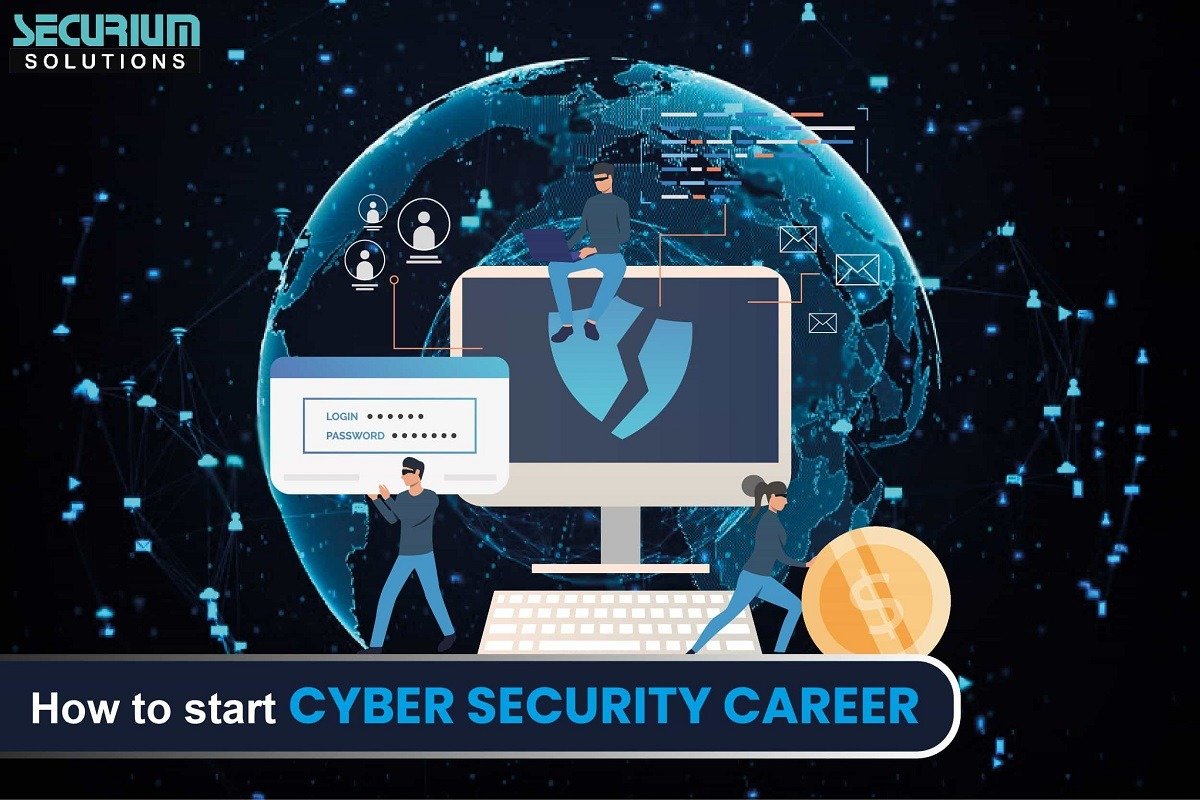In our fast-changing digital world, having a “Cyber Security Career” is really crucial. As technology grows, so do the risks to our online information. That’s where cyber security experts come in – they’re like digital protectors. This introduction gives you a sneak peek into what it means to work in cyber security and why it matters for our online safety.
1. Learn the Basics of Computers:
– Understand how to configure Windows Firewall for better system security.
– Learn about data exchange between servers and clients using protocols like HTTP, FTP, and SMTP.
– Familiarize yourself with the command line (CMD) to perform tasks efficiently.
– Gain knowledge about computer hardware components like RAM, ROM, and storage devices.
– Understand web browsers and developer tools, including rendering engines and scripting languages.
– Use Google dorks and OSINT websites to gather publicly available information on targets.
2. Dive Deep into Networking:
– Learn about the TCP/IP suite, which forms the foundation of the internet.
– Understand the OSI model to grasp network communication processes.
– Explore subnets for efficient network management.
– Study Virtual Private Networks (VPN), proxies, and firewalls for enhanced network security.
– Learn about honeypots, used to detect and deflect cyber attacks.
– Master SSH tunneling for secure remote access to systems.
– Configure and understand FTP and SMTP for data transfer and email communication.
3. Get Familiar with Programming Basics:
– Learn the fundamentals of C/C++ and Java programming languages, essential for cybersecurity scripting and tool development.
– Understand basic web technologies like HTML, CSS, and JavaScript for web application analysis.
4. Learn About Virtual Machines:
– Set up virtual machines to run multiple operating systems on your existing system.
– Install popular hacking and cybersecurity-focused operating systems like Kali Linux, Windows 7, Windows Server, Ubuntu, and Android emulators.
5. Focus on Linux:
– Dive deeper into Linux and understand its file structure.
– Master essential Linux commands for system administration, networking, and security tasks.
Now the Real thing starts
6. Footprinting and Information Gathering:
– Learn the art of footprinting to gather information about a target using public data and online resources.
– Perform WHOIS lookups to find domain ownership details.
– Utilize tools like Shodan, Netcraft, and Sublist3r to discover target-related information.
7. Network Scanning:
– Master the use of Nmap and Zenmap for comprehensive network scanning and reconnaissance.
– Learn how to capture and analyze network traffic using tools like Wireshark.
8. Vulnerability Analysis:
– Use vulnerability scanning tools like Nessus to identify potential weaknesses in systems and web applications.
– Leverage tools like Nikto and OWASP Zap to discover and address security flaws in web applications.
– Study SSL pinning bypass techniques and iOS jailbreaking to understand mobile device vulnerabilities.
9. System Hacking:
– Learn different techniques to hack into Android, Windows, and Linux systems.
– Understand common exploits like privilege escalation and password cracking.
10. Sniffing and Packet Analysis:
– Learn how network packets work and how to capture and analyze them using tools like Wireshark, tcpdump, and Tshark.
– Understand the risks associated with sniffing and how to protect against it.
11. Social Engineering:
– Study the art of social engineering, which involves manipulating individuals to gain unauthorized access to systems or data.
– Learn phishing techniques, website cloning, and crafting convincing phishing emails.
– Explore mass mail attacks for spreading malicious content.
12. Malware Threats:
– Understand different types of malware, including viruses, worms, and trojans.
– Study real-world examples of malware like AndroRAT, njRAT, keyloggers, and botnets.
13. Denial-of-Service (DoS) Attacks:
– Learn about different DoS attack methods, including LOIC and HOIC tools.
– Understand ICMP (Ping) flood, UDP flood, and Slowloris attacks and their impact on target systems.
14. Hacking Web Servers:
– Gain insights into hacking FTP and SMTP servers to compromise data or control email services.
– Learn techniques to gain unauthorized access to SSH servers.
After all that study Now you are good to go with certifications. Cybersecurity certifications enhance expertise and credibility, validating skills in specific areas. They open Cyber security career opportunities, demonstrate commitment to learning, and keep professionals updated with industry trends.
15. Cyber Security Career Certifications:
You have just a normal knowledge of cyber security, you have to find out your interest in cyber security basically there are major three roles in cyber security.
1. Red teaming
2. Blue teaming
3. Purple teaming
Red Team (Offensive Security):
Certified Ethical Hacker (CEH)
Offensive Security Certified Professional (OSCP)
Certified Penetration Testing Professional (eCPPT)
CompTIA PenTest+
Blue Team (Defensive Security):
Cisco Certified CyberOps Associate
CompTIA Security+
Certified Network Defender (CND)
CompTIA Cybersecurity Analyst (CySA+)
Purple Team (Combined Red and Blue Teaming):
Certified Information Systems Security Professional (CISSP)
Certified Cloud Security Manager (CCSM)
Certified Chief Information Security Officer (CCISO)
Certified Information Security Manager (CISM)
To Get any of the cyber security certification click here- https://www.securiumacademy.com
These are the few ones there are tons of certifications that can help you to increase your level , you can go with them also .
Remember, cybersecurity knowledge should be used responsibly and ethically, with proper authorization for testing and assessment purposes. Always respect privacy and adhere to applicable laws and regulations.
Conclusion for Cyber Security Career
As we wrap up this journey on “How to Start Your Cyber Security Career,” it’s clear that delving into the realm of cyber security offers an exciting path ahead. By grasping the basics of cyber security, building a strong foundation of cyber security knowledge, and obtaining relevant certifications, you pave the way for a rewarding cyber security career. Embracing continuous learning and staying updated with the ever-evolving field of cyber security is key. Remember, the world of cyber security is not only about codes and protocols; it’s about safeguarding our digital world. Whether you’re defending
Author
Sumit Singh




